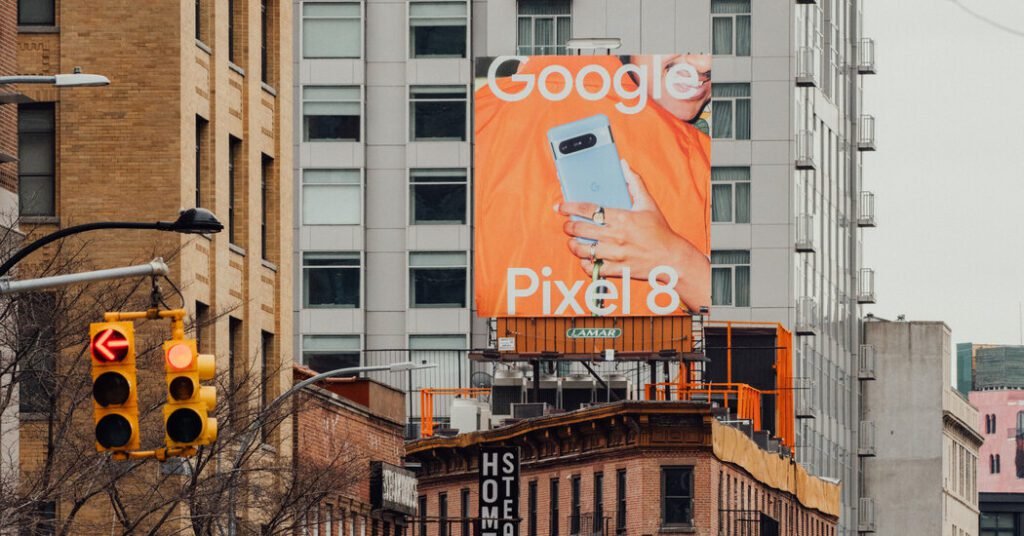Alphabet, the parent company of Google, on Tuesday reported search revenue and profit margin for the latest quarter that fell short of Wall Street expectations, in a sign that growth at its flagship and recent layoffs aimed at cutting costs , were not enough to offset its growing investment in artificial intelligence.
The Internet giant reported that revenue from its search engine, its biggest unit, was $48 billion in the fourth quarter, up 13 percent, but slightly below analysts’ estimate of $48.1 billion.
The company said a measure of profitability, called operating margin, was 27 percent in the fourth quarter, below the 28 percent analysts were looking for. The company said its overall profit rose 52 percent to $20.7 billion, beating Wall Street expectations of $20.2 billion, according to data compiled by FactSet.
Alphabet reported quarterly sales of $86.3 billion, up 13% from a year ago and above analysts’ estimate of $85.2 billion.
Alphabet has carried out a rolling series of layoffs in recent months, cutting jobs in ad sales, YouTube, news and elsewhere. The cuts were part of an effort by Sundar Pichai, Google’s chief executive, to offset the company’s growing investment in artificial intelligence.
Shares of Alphabet fell more than 5 percent in after-hours trading on Tuesday.
In 2022, rising interest rates and inflation have made advertisers cheaper, undermining sales and profits for Alphabet as well as peers Snap and Meta, which own Facebook and Instagram. After Google’s ad business rebounded last year, investors hoped advertisers would continue to spend more.
Thomas Monteiro, an analyst at Investing.com, wrote in a note that the subdued growth was a reminder that companies were still being cautious with their ad spending.
“This report is a big warning sign for ad-dependent companies,” Mr. Monteiro wrote, adding that Alphabet will have to continue to improve its margins to offset muted growth, “even as it presses gas for further layoffs”.
As of Dec. 31, Alphabet had 182,502 employees, up slightly from 182,381 three months earlier, but down from a year earlier. Some of the recent job cuts took place in January. At the end of 2019, the company’s workforce totaled 119,000, before it went on a hiring spree during the pandemic when it saw increased use of its online services. The company cut 12,000 workers from its payroll early last year.
“We are disciplined in how we operate the company,” Mr. Pichai said Tuesday afternoon on a conference call. “Teams are working to focus on key priorities and execute quickly by removing layers and simplifying their organizational structures.”
Google has focused on its AI ambitions, hoping it can overcome the perception that it lags behind OpenAI, the maker of the popular chatbot ChatGPT. Google debuted its Gemini AI model, its most powerful yet, in December, and has worked to integrate the technology into its various products, including its Pixel smartphone, Chrome web browser and Bard, the its competitor at ChatGPT.
These types of systems are expensive to run because they require huge amounts of computing power. Google has tried to cut costs to offset these expenses while maintaining its famously large profits. Analysts have been closely watching the company’s profit margin after Alphabet executives pledged in recent quarters to cut the company’s expenses on an ongoing basis.
Google continues to depend on its advertising business to pay for these efforts. Ad sales on YouTube, Google’s video platform, rose 16% to $9.2 billion, beating the $9.2 billion analysts expected.
Google Cloud, the company’s division that offers software and technology services to other businesses, reported sales that rose 26% to $9.2 billion. Analysts had estimated $8.9 billion. The department had hoped that other companies would seize the opportunity to gain access to Google’s genetic AI systems, boosting its revenue, but its growth rate has slowed from previous years.

